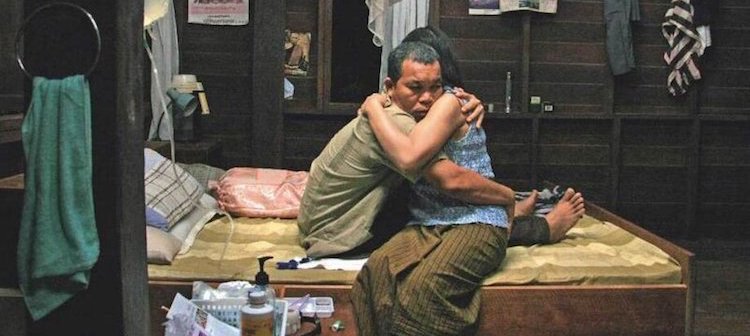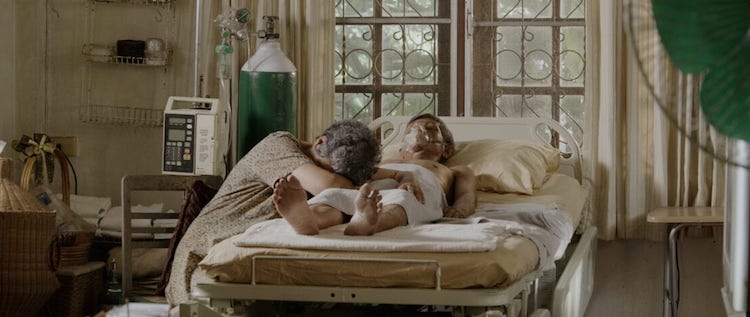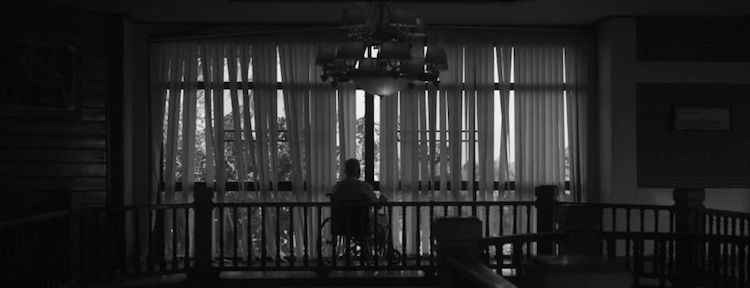


Apichatpong Weerasethakul’s most celebrated work, Uncle Boonmee Who Can Recall His Past Lives (ลุงบุญมีระลึกชาติ), was also his first overt political statement on film. Boonmee — a former military officer who fought the student communists radicalised after the 6th October 1976 massacre — is dying of kidney disease, and wonders aloud whether he is being punished: “I’ve killed too many communists.” His sister tries to reassure him — “But you killed with good intentions... You killed the commies for the nation, right?” — though Boonmee is unconvinced, and the conversation peters out; a brutal guerrilla war has become a faded memory, both for Boonmee and the country as a whole.
Two recent Thai films also portray former military men on their deathbeds. In the opening line of Taiki Sakpisit’s The Edge of Daybreak (พญาโศกพิโยคค่ำ), a man narrates his role in the anti-communist purge: “I was leading my unit into the woods to catch the students.” Similarly, Jakrawal Nilthamrong’s Anatomy of Time (เวลา) begins with a flashback in which a military officer leads an attack on communist insurgents. In both films, the unnamed men remain largely bedridden, tended by nurses and family members, though their violent reputations have not been forgotten: in The Edge of Daybreak, the man is smothered with a pillow; and in Anatomy of Time, the man’s nurse wishes him a “slow and painful” death. (On the other hand, like Boonmee’s sister, one of his military colleagues believes he “made many sacrifices for the country.”)
In all three films, the men’s karma is directly cited as the reason for their sickness. In an extended flashback in Anatomy of Time, the man’s wife asks: “Dad, is it true that we all have to pay for our sins?” Her father explains that, according to Buddhist teachings, karma does indeed exist. Likewise, Boonmee tells his sister: “You know, this is a result of my karma.” In The Edge of Daybreak, the man’s family believe that they are cursed and, as if to confirm this, the exquisite black-and-white camerawork lingers on images of decay, such as rotting food and their crumbling home. The legacy of violent suppression is also a curse on the country itself, and these three films offer a reckoning with Thailand’s past and a commentary on its continuing military rule.
Two recent Thai films also portray former military men on their deathbeds. In the opening line of Taiki Sakpisit’s The Edge of Daybreak (พญาโศกพิโยคค่ำ), a man narrates his role in the anti-communist purge: “I was leading my unit into the woods to catch the students.” Similarly, Jakrawal Nilthamrong’s Anatomy of Time (เวลา) begins with a flashback in which a military officer leads an attack on communist insurgents. In both films, the unnamed men remain largely bedridden, tended by nurses and family members, though their violent reputations have not been forgotten: in The Edge of Daybreak, the man is smothered with a pillow; and in Anatomy of Time, the man’s nurse wishes him a “slow and painful” death. (On the other hand, like Boonmee’s sister, one of his military colleagues believes he “made many sacrifices for the country.”)
In all three films, the men’s karma is directly cited as the reason for their sickness. In an extended flashback in Anatomy of Time, the man’s wife asks: “Dad, is it true that we all have to pay for our sins?” Her father explains that, according to Buddhist teachings, karma does indeed exist. Likewise, Boonmee tells his sister: “You know, this is a result of my karma.” In The Edge of Daybreak, the man’s family believe that they are cursed and, as if to confirm this, the exquisite black-and-white camerawork lingers on images of decay, such as rotting food and their crumbling home. The legacy of violent suppression is also a curse on the country itself, and these three films offer a reckoning with Thailand’s past and a commentary on its continuing military rule.
